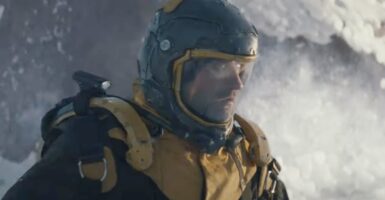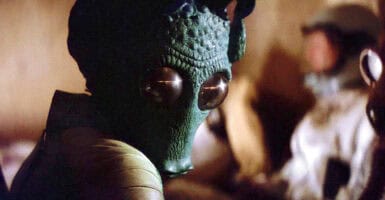A Giant Freakin’ Thanksgiving 2013
This article is more than 2 years old
Joelle’s Thankful For…
Classic Sci-Fi Books
This Thanksgiving, like all the rest, I’m thankful for the awesome science fiction I’ve read this year. None of these books are recent publications, but they’re new to me, and all of them do what science fiction does at its best: pull me into a world so thoroughly that nothing seems strange or impossible. A world so convincingly rendered that when I’m away from it, I find myself thinking about it and wanting to return as soon as possible.
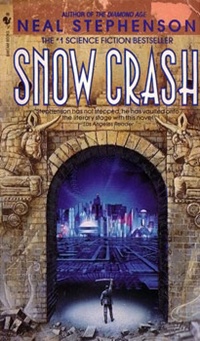 While traveling in Portugal this summer, I read Neal Stephenson’s Snow Crash on my Kindle. The place and the medium are important — they added dimension and believability to a book all about speed, movement, and digital worlds. The book maintains an incredible pace — it starts with a race and it never lets up. Stephenson establishes a satirical tone right away, as the protagonist tries desperately to deliver a pizza within the promised 30-minute window. The Mafia-run pizza delivery system serves as an axis around which the futuristic world turns, which, while ironic and sarcastic, isn’t difficult to imagine. The hero, the soon to be ex-pizza delivery guy, is a master swordsman and a computer genius. Those three skill sets encompass everything important in this world, and in some ways, in ours. The other main character is a teenage girl who happens to be the most bad-ass skateboard courier in town. She harpoons people’s cars, which is how she meets our pizza protagonist, to hitch rides. The image of a skateboarder being pulled behind a speeding car perfectly illustrates the way the novel works — its narrative is fueled by the dangerous and dynamic connections between various entities: the virtual world and the physical one, the two protagonists, the Mafia and the villains behind a cyber-virus that can affect players’ real brains. Stephenson’s cyberpunk-on-speed present-tense prose powers through a few borderline incoherent theories about linguistics and religion and makes it impossible to disengage from the story. Simply put, Snow Crash is just crazy fun. Order a pizza and give it a read.
While traveling in Portugal this summer, I read Neal Stephenson’s Snow Crash on my Kindle. The place and the medium are important — they added dimension and believability to a book all about speed, movement, and digital worlds. The book maintains an incredible pace — it starts with a race and it never lets up. Stephenson establishes a satirical tone right away, as the protagonist tries desperately to deliver a pizza within the promised 30-minute window. The Mafia-run pizza delivery system serves as an axis around which the futuristic world turns, which, while ironic and sarcastic, isn’t difficult to imagine. The hero, the soon to be ex-pizza delivery guy, is a master swordsman and a computer genius. Those three skill sets encompass everything important in this world, and in some ways, in ours. The other main character is a teenage girl who happens to be the most bad-ass skateboard courier in town. She harpoons people’s cars, which is how she meets our pizza protagonist, to hitch rides. The image of a skateboarder being pulled behind a speeding car perfectly illustrates the way the novel works — its narrative is fueled by the dangerous and dynamic connections between various entities: the virtual world and the physical one, the two protagonists, the Mafia and the villains behind a cyber-virus that can affect players’ real brains. Stephenson’s cyberpunk-on-speed present-tense prose powers through a few borderline incoherent theories about linguistics and religion and makes it impossible to disengage from the story. Simply put, Snow Crash is just crazy fun. Order a pizza and give it a read.
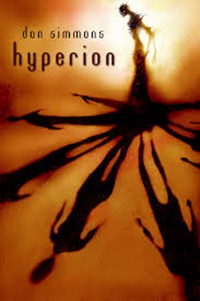 While on that same trip, I read Hyperion. And then, because the damn book ends just before the action begins, I promptly bought the sequel (thank you, Kindle). The first one was one of those golden travel books. I was on a long bus ride and I read and read and was kind of sad when I arrived at my destination. I loved this book in the same way, though perhaps not quite as much, as Patrick Rothfuss’ The Name of the Wind. That’s another review for another time, but their darkness and depth evokes far more powerful emotions than most sci-fi, much like Babylon 5. But back to Hyperion, a sci-fi Canterbury Tales. Seven people are chosen for a dangerous mission to try and save the Hegemony, their intergalactic world. In a last desperate effort, the pilgrims travel to planet Hyperion to ask the Shrike, guardian of the Time Tombs, to grant a request, even though it’s far more likely that the Shrike will kill them. The entire first book consists of the characters telling their background stories as they try to figure out why they in particular were chosen for the mission. The first book ends just as they arrive on Hyperion, so Simmons has us there. We only hear six of the seven stories, and two of them are so phenomenal that they easily could have been their own novels. The other four are excellent as well, but I got so into those two backstories that I totally forgot about the frame narrative and the other characters. By the time they arrive on Hyperion, I had my favorites. Maybe that’s Simmons’ strategy — while readers root for the success of the mission, they root for some characters more than others. And those are the ones Simmons saves for last. He’ll kill off some of the less appealing characters to build the tension, and then when it comes to the ones readers truly care about, he pulls out all the stops. I got teary, anxious, and relieved, but all the while I was completely immersed. Simmons’ endless Keats references get to be a bit much, especially in the second book. I like Keats too, but it felt a bit self-indulgent to me, making the reader wade through Keats’ history to see if their favorite character lives. The second book was good and full of epic plot developments that unambiguously end the story started in the first book, but the first one is the real masterpiece.
While on that same trip, I read Hyperion. And then, because the damn book ends just before the action begins, I promptly bought the sequel (thank you, Kindle). The first one was one of those golden travel books. I was on a long bus ride and I read and read and was kind of sad when I arrived at my destination. I loved this book in the same way, though perhaps not quite as much, as Patrick Rothfuss’ The Name of the Wind. That’s another review for another time, but their darkness and depth evokes far more powerful emotions than most sci-fi, much like Babylon 5. But back to Hyperion, a sci-fi Canterbury Tales. Seven people are chosen for a dangerous mission to try and save the Hegemony, their intergalactic world. In a last desperate effort, the pilgrims travel to planet Hyperion to ask the Shrike, guardian of the Time Tombs, to grant a request, even though it’s far more likely that the Shrike will kill them. The entire first book consists of the characters telling their background stories as they try to figure out why they in particular were chosen for the mission. The first book ends just as they arrive on Hyperion, so Simmons has us there. We only hear six of the seven stories, and two of them are so phenomenal that they easily could have been their own novels. The other four are excellent as well, but I got so into those two backstories that I totally forgot about the frame narrative and the other characters. By the time they arrive on Hyperion, I had my favorites. Maybe that’s Simmons’ strategy — while readers root for the success of the mission, they root for some characters more than others. And those are the ones Simmons saves for last. He’ll kill off some of the less appealing characters to build the tension, and then when it comes to the ones readers truly care about, he pulls out all the stops. I got teary, anxious, and relieved, but all the while I was completely immersed. Simmons’ endless Keats references get to be a bit much, especially in the second book. I like Keats too, but it felt a bit self-indulgent to me, making the reader wade through Keats’ history to see if their favorite character lives. The second book was good and full of epic plot developments that unambiguously end the story started in the first book, but the first one is the real masterpiece.
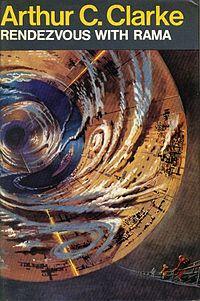 The last book I read is one I’ve been meaning to read for years — Arthur C. Clarke’s Rendezvous with Rama. I love Clarke almost as much as Ray Bradbury (Bradbury’s untouchable). He’s just a ridiculous genius. The guy invented GPS, which is why most of the satellites reside in the Clarke Belt in low-Earth orbit. While researching in Sri Lanka, he fell in love with the place and lived out the last half of his life there, scuba diving and generally being awesome. Oh, and being the Chancellor of the International Space University. And a Knight. He was also gay and a Buddhist. Now that’s a guy with depth. Anyway, Rama won all the major awards — Hugo, Nebula, and whatever else there are. And I can see why. The premise is vintage Clarke — a planetary body is spotted moving toward the sun, and upon investigation, the humans learn that it’s some kind of spaceship — well, not a spaceship exactly, but an entire world that moves like a spaceship and turns on an axis, kind of like Babylon 5. A ship from Earth goes to investigate, and most of the novel is spent as the characters explore the strange world, which has weather, bio-robotic life forms, sounds, and lights. As Rama moves closer to the sun, where everyone assumes it will simply melt and burn, but not before some pretty crazy atmospheric and environmental episodes, the humans hurry to learn its secrets and figure out what happened to the Ramans themselves. Clarke is a master of the existential sci-fi story and often emphasizes the relative smallness and insignificance of humans by juxtaposing them against other races and worlds that elude human understanding. This book is no different. While my favorite is still Childhood’s End, Rama leaves readers with that “you ain’t seen nothing yet!” feeling, which quickly provokes a sense of awe both in Clarke’s prowess and in the universe itself. You can’t ask for much more than that from a book.
The last book I read is one I’ve been meaning to read for years — Arthur C. Clarke’s Rendezvous with Rama. I love Clarke almost as much as Ray Bradbury (Bradbury’s untouchable). He’s just a ridiculous genius. The guy invented GPS, which is why most of the satellites reside in the Clarke Belt in low-Earth orbit. While researching in Sri Lanka, he fell in love with the place and lived out the last half of his life there, scuba diving and generally being awesome. Oh, and being the Chancellor of the International Space University. And a Knight. He was also gay and a Buddhist. Now that’s a guy with depth. Anyway, Rama won all the major awards — Hugo, Nebula, and whatever else there are. And I can see why. The premise is vintage Clarke — a planetary body is spotted moving toward the sun, and upon investigation, the humans learn that it’s some kind of spaceship — well, not a spaceship exactly, but an entire world that moves like a spaceship and turns on an axis, kind of like Babylon 5. A ship from Earth goes to investigate, and most of the novel is spent as the characters explore the strange world, which has weather, bio-robotic life forms, sounds, and lights. As Rama moves closer to the sun, where everyone assumes it will simply melt and burn, but not before some pretty crazy atmospheric and environmental episodes, the humans hurry to learn its secrets and figure out what happened to the Ramans themselves. Clarke is a master of the existential sci-fi story and often emphasizes the relative smallness and insignificance of humans by juxtaposing them against other races and worlds that elude human understanding. This book is no different. While my favorite is still Childhood’s End, Rama leaves readers with that “you ain’t seen nothing yet!” feeling, which quickly provokes a sense of awe both in Clarke’s prowess and in the universe itself. You can’t ask for much more than that from a book.
Pages [ 1 2 3 4 5 6 7 ]




